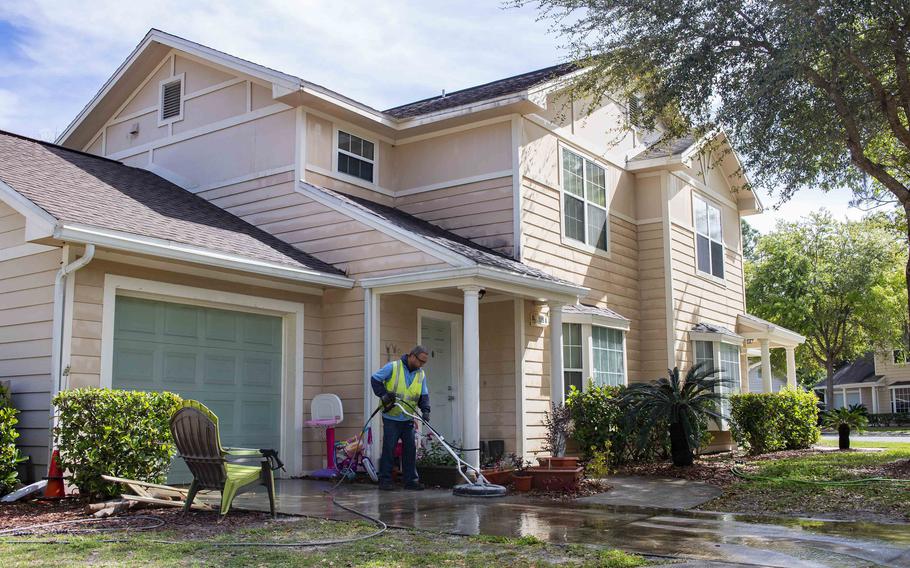
A maintenance worker for Balfour Beatty Communities in March 2019 power washes the driveway of a home at Marsh Cove, a military residential community at Naval Station Mayport, Fla. (Nathan T. Beard/ Navy )
WASHINGTON — Lawmakers dismayed by persistent unsafe conditions in privatized military housing are pushing for the creation of a council to provide oversight, collect public complaints and report its findings to Congress.
Bills introduced in the Senate and House this week call for a new Military Housing Readiness Council to serve as a focal point for accountability after years of sluggish efforts by the Defense Department to improve poor housing. The group would be comprised of Defense Department officials, service members, military families and military housing experts.
They would be tasked with implementing a tenant bill of rights that gives military families more power to negotiate with companies that manage on-base housing and completing a database to field complaints from the public. Service members and their families have long raised alarm over dangerous conditions such as mold, asbestos, roof leaks and rodent infestations in the privatized housing system.
“I’ve heard horror stories from constituents about military housing overrun with black mold that’s harmed their health and the health of their families, including their small kids," said Rep. Sara Jacobs, D-Calif., a bill co-sponsor. "This is a problem in San Diego and all across the country that lowers military readiness and morale and makes us all less safe."
Sens. Elizabeth Warren, D-Mass., and Thom Tillis, R-N.C. are sponsoring the Senate version of the measure.
Rep. Stephanie Bice, R-Okla., said housing conditions at Tinker Air Force Base near Oklahoma City have improved in recent years but problems continue to abound nationally.
“There are still a range of nationwide issues that require greater oversight, including the timeliness of repairs, abatement of mold and the timely accommodation of individuals with disabilities,” she said in a statement. “We must ensure our service members and their families have reliable and safe housing conditions.”
Lawmakers have passed several measures to increase oversight, including the tenant bill of rights, but it has not been enough to crack down on negligent landlords, said Rep. Katie Porter, D-Calif.
In April, a Senate investigation found that one of the largest private providers of military housing, Balfour Beatty Communities, ignored residents’ reports of poor living conditions even after pleading guilty to defrauding the Army, Navy and Air Force. The company operates more than 43,000 residences in 26 states that house some 150,000 military family members.
“It’s clear we need to do more to hold private companies accountable to the law,” Porter said in a statement.
Congress allowed the Defense Department to privatize military housing in 1996 and now private companies own and operate about 99% of all homes on U.S. military installations, according to the Government Accountability Office, a federal watchdog.
A 2018 investigation by the news agency Reuters showed the ill effects of the privatization effort, revealing rodent-soiled cribs, ceiling leaks that collapsed into bedrooms and other widespread health and safety hazards. Service members and their families said landlords either ignored maintenance requests or made shoddy repairs.
The proposed council would review and make recommendations for inspection practices, resident surveys, maintenance work order systems and landlord payment of medical bills for residents sickened by their living conditions. The group would be expected to meet at least four times a year and provide annual reports analyzing complaints, housing inspections and maintenance requests and response times.
Representatives from the International Code Council, a building code and standards group, and the Institute of Inspection Cleaning and Restoration Certification, a nonprofit that certifies and sets standards for the inspection industry, would have a seat on the council.
The chairpersons and ranking members of the House and Senate Armed Services committees could select other members of the council, according to the bill.
A March report by the Government Accountability Office stated the Defense Department has made progress in increasing the frequency of home inspections, using a standardized inspection checklist and adjusting incentive fees for companies based on quality of work rather than its speed.
But the Pentagon remains hamstrung by the power of the housing companies and cannot implement some legislative provisions without a consensus from private landlords, the department said. As of March, companies operating at five military installations still have not reached an agreement on the tenant bill of rights.
“While [the Department of Defense] has taken numerous actions to improve its oversight, a continued emphasis on oversight is critical to ensure quality housing for service members and their families,” the report states.
The Senate is including the housing council provision in its version of the 2023 National Defense Authorization Act, an annual bill that sets military policy and authorizes Pentagon spending levels. The upper chamber is expected to take up the legislation in September after returning from recess and eventually merge it with the House version of the bill.